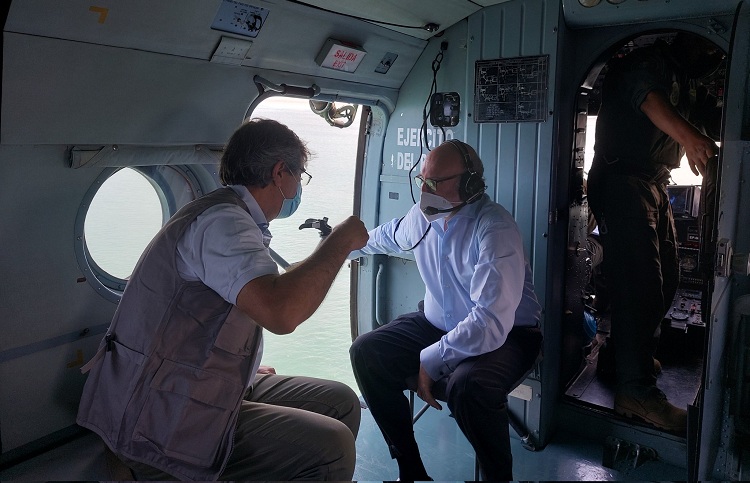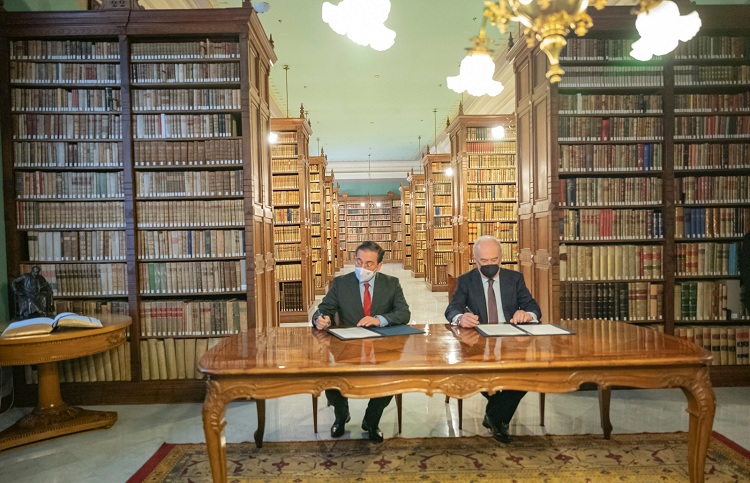The Diplomat
The Secretary of State for Latin America and the Caribbean and Spanish in the World, Juan Fernández Trigo, has observed on the ground the effects of the oil spill that occurred on January 15 off the coast of Lima and Callao, in Peru, from a refinery of the Spanish oil company Repsol.
Fernández Trigo has been in the Andean country since Wednesday to discuss the situation with government authorities and with representatives of Repsol. On the first day, the Secretary of State was received by the Vice Minister of Foreign Affairs, Luis Enrique Chávez, to whom he conveyed “Spain’s solidarity and our country’s commitment to environmental policies”.
Fernández Trigo then toured the coastline affected by the spill, accompanied by Repsol’s director in Peru, Jaime Fernández-Cuesta. “We regret the consequences for the ecosystem and we sympathize with those affected. Now the priority is to advance the works to recover normality as soon as possible,” stated Fernández Trigo through his Twitter account. Subsequently, the Secretary of State visited Repsol’s La Pampilla refinery, where he visited the team of international experts and was able to learn about the advanced technology being used in the spill recovery work.
Yesterday, Fernández Trigo met with the Mayor of Callao, Pedro López, to “know his assessment of the recovery works” and had a dialogue with “some inhabitants of the affected areas and listen to their concerns”. Later, he was received by the Mayor of Lima, Jorge Muñoz, to know his assessment of the recovery works. “We agreed on the importance of environmental defense policies and solidarity with those affected,” stated the Secretary of State through the social network.
This is Fernández Trigo’s second trip to Peru since the arrival of Pedro Castillo to the Presidency, after the one he made last November to meet in Lima with several ministers and other government representatives.
The trip of the Secretary of State comes after last Monday the Peruvian Government ordered “the suspension of all the activities of loading and unloading of hydrocarbons in the Peruvian sea by the operator Repsol” until the Spanish multinational “provides the technical guarantees that there will not be another spill in the sea”, according to the Minister of the Environment, Rubén Ramírez.
The spill occurred on January 15 as a consequence of the tsunami caused by the eruption of a volcano in Tonga. Repsol has defended itself by assuring that it was an “unforeseeable maritime phenomenon” and expressed its displeasure at the Peruvian government’s decision, “as it considers it disproportionate and unreasonable”. However, it added, “in order to guarantee the supply of its products, it expresses its full availability to collaborate with the Peruvian authorities, so that the indicated activities can be resumed as soon as possible”.
Repsol also recalled that the La Pampilla refinery supplies 40% of the Peruvian fuel market and assured, therefore, that it will make “the greatest efforts to avoid the risk of shortage of essential products for Peruvian citizens and the development of the country” and that it will devote “all its resources and efforts to clean up the spill and support the affected populations and fauna”.
Last Monday, the Minister of Foreign Affairs, José Manuel Albares, referred to this “accident that we all regret” during his appearance before the Ibero-American Affairs Commission of the Senate and assured that, “from the first moment, both the company and the Government are putting all the expertise that Spain has in spills to minimize the impact”.






